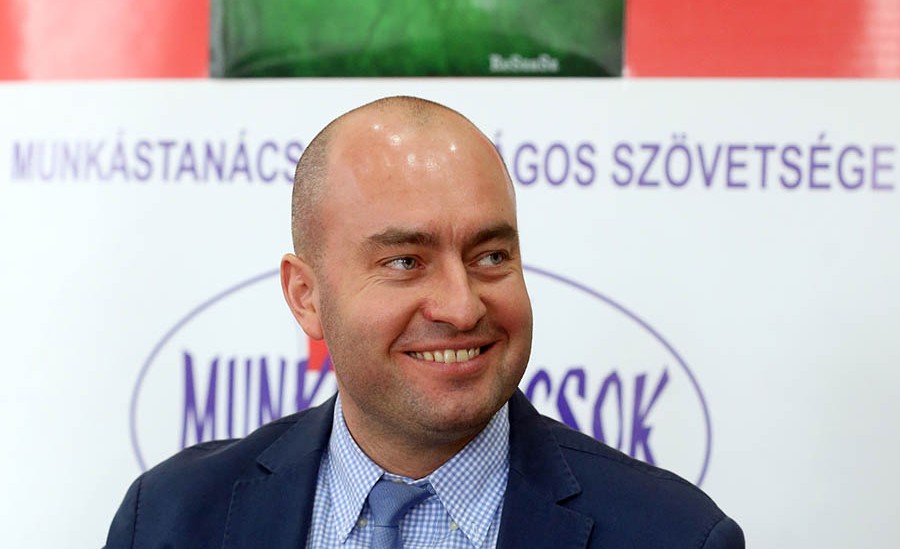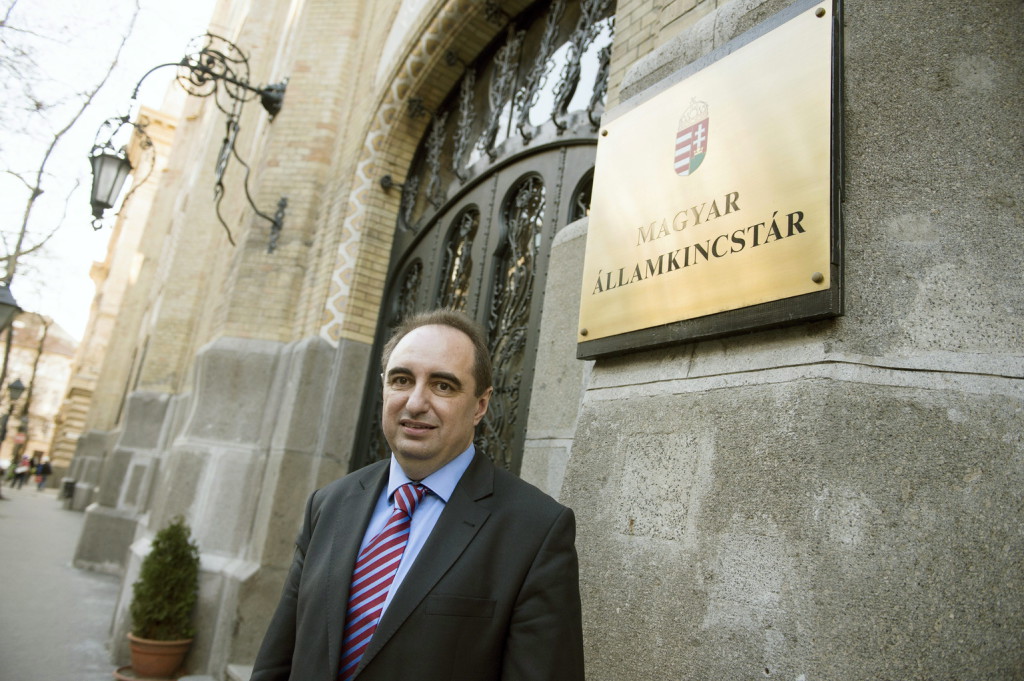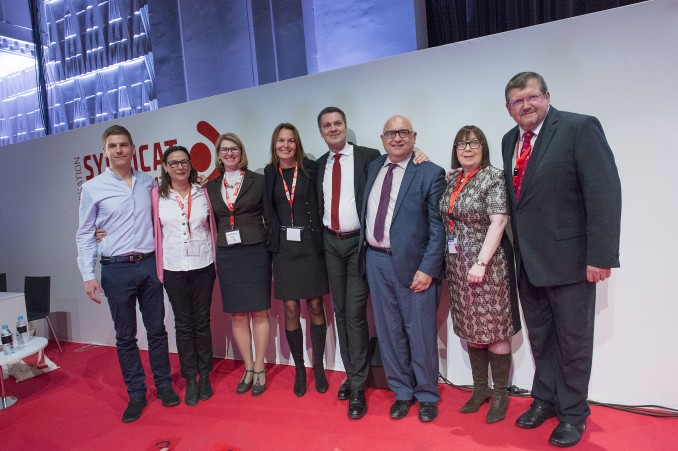Residents’ and Specialists’ Trade Union (ReSzaSz) established
The Trade Union of Residents and Specialists would like to achieve better wages and more transparency in the health care sector even at the cost of demonstrations or strikes. “It is also the interest of patients to be able to understand the operation of hospitals and to enjoy safety even if they do not pay parasolvency (gratitude money) - says Tamás Dénes, president of the new union. If they cannot make themselves heard, the first action of the new union will be the refusal of voluntary overtime.
Growing chaos in public sector wages
Despite the statements of the Hungarian State Treasury (MÁK), the payment of wages is still problematic in the public sector. Besides deficient payment, overpayment also occurs. Moreover, employees do not receive their pay lists or adequate information – was stated at an event organised by the National Confederation of Workers’ Councils.
Paris Manifesto – Stand up in solidarity for quality jobs, workers’ rights and a fair society in Europe
The ETUC represents all working people in Europe. It exists to negotiate, campaign and take action for better living and working conditions.
SOLIDARITY STATEMENT – Nurses will march through the streets of Budapest on 12th May 2015
Health care provision in Hungary has reached an alarming state. [...]
EZA-Startseminar 2014 in Budapest
Die Definition der Brennpunkte des sozialen Dialogs aus europäischer Perspektive sowie Handlungsmöglichkeiten für Arbeitnehmerorganisationen waren die Schwerpunkte des EZA-Startseminars, das vom 27. bis 28. November 2014 in Budapest, Ungarn, stattfand und in Zusammenarbeit mit MOSZ (Munkástanácsok Országos Szövetsége) und mit Unterstützung der Europäischen Union organisiert wurde.
On September 18-19, 2014, EZA organised a two-day seminar
On September 18-19, 2014, EZA organised a two-day seminar in cooperation with MOSZ (National Federation of Workers’ Councils), at Rubin Hotel Budapest, titled “Strategies for Workers' Organisations to Design Employment and Social Policy with European Funding Possibilities”. Imre Palkovics, President of MOSZ, Nándor Csepreghy, Deputy State Secretary responsible for the Communication of Development Policy, and Roswitha Gottbehüt, Secretary General of EZA, participated in the press conference.
STRENGTHENING SOCIAL DIALOGUE: SHAPING EUROPEAN INTEGRATION
Leaderships of TUC NEZAVISNOST and Hungarian trade union centre MOSZ met on a joint seminar held in Novi Sad on 30 September and 1 October 2014 in the scope of the EZA project “Strengthening the Social Dialogue – Shaping European Integration”: special project of employee organizations in countries from the Western Balkans. Participants in the seminar included top leadership and expert labour legislation teams of both trade union centres, representatives of the TUC NEZAVISNOST Provincial Board for the Autonomous Province of Vojvodina (APV) and the Vojvodina Provincial Secretariat for Employment, Economy and Gender Equality, as well as an EZA representative.
Manifesto 2014: Fiscal incentives are indispensable prequisites
Manifesto 2014: Fiscal incentives are indispensable prequisites Worldwide practical evidence and a wide range of academic research support the view that a proper legal environment and the provision of suitable fiscal incentives are indispensable prerequisites for any policy truly aiming the development of employee share ownership. Moreover, such evidence and research also show that fiscal incentives always pay off medium/long term and in many ways. Organisations promoting employee owner-ship around the world have demanded persistently and consistently supportive legislations including fiscal incentives for the common good (evidenced in additional growth and profitability, the spread of wealth, contribution to economic and social stability). New fiscal incentives pave the way to new encouraging development, while political decisions reducing or cutting such incentives always lead to regression.
SZTE FIDO – The Trade Union of Young Workers established
The Trade Union of Young Workers at the Szeged University (SZTE FIDO – with Hungarian acronym) held its first meeting on 28 May 2014. Gábor Holecz, vice-president for the public sector of MOSZ, also participated at the event, talking about the situation and role of trade unions, with special emphasis on his own organisation, the Trade Union of Customs and Finance Guards. A further guest speaker was Imre Szabó, head of the Youth section at MOSZ, placing the emphasis on the need for the young generation to increase its involvement in trade union work, supporting his arguments with several examples from the past in the context of higher education.
The Annual meeting of the MOSZ General Assembly
The Annual meeting of the MOSZ General Assembly was held on 30 May 2014 at Hotel Rubin, in the usual well-organised manner, with pleasant and informative debates on substantive issues and enthusiastic guidance, which serves as orientation for the coming year. One of the most important points of the General Assembly was the farewell to István Kovács, Head of the Supervisory Board, who resigned from this position after long years of work. The new Supervisory Board was also elected, delegates elected László Szente as the new head of the Board, whose members are Ferenc Buzder, Csaba Horváth, Miklós Kucsera, Miklós Sümegvári. Sándor Herega was elected as head of the Credentials and Nominations Committee, whose members are Ferenc Bélavári and László Horvai.
„Workers’ cross-border mobility in Europe, the tasks of trade unions, employers and governments in this respect” 15-16 May 2014, Budapest
The seminar was opened by Mr. Imre Palkovics, President of the National Federation of Workers’ Councils. The president said: the theme of the seminar chosen by MOSZ and EZA together is highly topical, which is even more relevant now with the EP elections approaching. The question of the opportunities for trade union cooperation at European level within the framework of EZA is raised with this respect. We can also inform the political parties running at the elections about the outcome of the exchange of ideas, shared concerns and objectives of the representatives of the Central-and East European countries and ’old’ MS.
New wage agreement for this year in the road transport sector
As a result of negotiations taking two months, the Association of Road Transport Enterprises and trade unions came to an agreement this week on the wage increase guaranteed for 2014.




